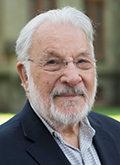Klaus Krippendorff, Annenberg School for Communication
 Klaus Krippendorff, the Gregory Bateson Professor Emeritus of Communication in the Annenberg School for Communication and the longest-serving tenured faculty member in the school’s history, died on October 10. He was 90.
Klaus Krippendorff, the Gregory Bateson Professor Emeritus of Communication in the Annenberg School for Communication and the longest-serving tenured faculty member in the school’s history, died on October 10. He was 90.
Klaus Herbert Krippendorff was born in 1932 in Frankfurt, Germany, and settled in Halberstadt, where he remembered the American bombardment that ended World War II. From 1946-1949, he was an apprentice in a mechanic’s shop. During the Russian occupation of Germany, his family snuck across the border on foot in the dead of night for Western-controlled Germany. The family reunited in Düsseldorf, West Germany, and Dr. Krippendorff got a job as a toolmaker in a factory. He became part of a revival of the Wandervogel, hitchhiking through Europe and working on a reforestation project to replace the trees the British had taken as war reparations.
Dr. Krippendorff completed his graduate education in engineering in 1954 at the State Engineering School in Hanover, Germany. He then attended the Ulm School of Design, and after graduation, with a Ford Foundation Fellowship and Fulbright Fellowship to study at Princeton University, Dr. Krippendorff traveled to the United States. He completed his PhD at the University of Illinois, Urbana-Champaign’s Institute of Communications Research. He took his first and only faculty position as a member at the Annenberg School for Communications at Penn in 1964, beginning to teach before he had completed his PhD.
Driven by his early interest in design, Dr. Krippendorff advanced the study of human-centered design, publishing numerous articles culminating in a seminal book, The Semantic Turn: A New Foundation for Design. He advanced theories of social constructionism, the idea that language shapes our reality, which have influenced the fields of psychology, organizational design, and advertising, among others. He developed a course on the subject for which graduate students voted the best doctoral course at Penn in 1998. Dr. Krippendorff became one of the most prominent researchers in the field of cybernetics, which has advanced our understanding of cognitive, psychological, and social systems, among others, and contributed to the field of machine learning. For his work, he was awarded the Norbert Wiener Medal in Cybernetics by the American Society for Cybernetics in 2001 and the Norbert Wiener/Hermann Schmidt Prize from the German Society for Cybernetics and German Society for Pedagogy and Information in 2004.
Dr. Krippendorff is perhaps best-known for his pioneering work in content analysis, the science of categorizing written, audio, or visual content to make it analyzable. His most well-known creation, “Krippendorff’s Alpha,” developed in the late 1960s, was a mathematical formula to ensure that researchers had a basic agreement on the nature of the phenomenon being analyzed. “While other methodologies used in communication are borrowed from other fields, content analysis belongs squarely to the discipline in which Dr. Krippendorff was a central figure,” said Dr. Krippendorff’s longtime colleague in the Annenberg School, Robert C. Hornik. Dr. Krippendorff’s Alpha remains one of the gold standards in content analysis. Another of his books, Content Analysis: An Introduction to Its Methodology, is recognized as one of the most influential in the field, having been cited more than 50,000 times and receiving the International Communications Association (ICA) Fellows Book Award in 2001.
In 1984, Krippendorff became the first of four Annenberg faculty to serve as presidents of ICA. In his inaugural address, Dr. Krippendorff discussed the constructive nature of science, saying that unlike the notion that science is purely objective, scientists make decisions about what to study and how to study it.
“Klaus became one of the significant players in establishing the centrality of the Annenberg School within the field,” said Larry Gross, Dr. Krippendorff’s colleague at Penn’s Annenberg School from 1968 to 2003. “Klaus, through his involvement with ICA, played a role in connecting the school with the theoretical end of the discipline.”
Throughout his career, Dr. Krippendorff published more than 250 books and articles on communication, cybernetics, and human-centered design. He received numerous awards, including an honorary degree from Linnaeus University, Sweden. He also was a fellow of the American Association for the Advancement of Science (AAAS), the International Communication Association (ICA), the East-West Center in Hawaii, and the Netherlands Institute for Advanced Studies.
Outside of his work in communications, Dr. Krippendorff was heavily involved elsewhere at Penn. In 1971, he and several Annenberg students joined a group of nonviolent peace activists using their bodies and canoes to blockade a ship carrying weapons to Bangladesh. It formed the basis of the documentary Blockade, which was screened at Annenberg in 2017. In 1984, Dr. Krippendorff was named president of the International Communication Association.
He is survived by his wife, Margaret Thorell; his former wife, Sultana Alam; his children, Kaihan Pascal Krippendoff (Pilar Ramos) and Heike Krippendorff Sullivan (Brendan); three step-children; seven grandchildren; and five step-grandchildren.
A memorial service for the Penn community will be held on Friday, October 28 at 3:30 p.m. in room 110 at the Annenberg School for Communication. Donations in his memory can be made to the Klaus Krippendorff Memorial Fund at the University of Pennsylvania.
---
To Report A Death
Almanac appreciates being informed of the deaths of current and former faculty and staff members, students and other members of the University community. Call (215) 898-5274 or email almanac@upenn.edu.
However, notices of alumni deaths should be directed to the Alumni Records Office at Suite 300, 2929 Walnut St., (215) 898-8136 or email record@ben.dev.upenn.edu.
